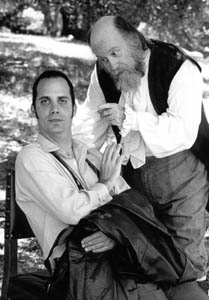![[Metroactive Stage]](/gifs/stage468.gif)
[ Stage Index | Santa Cruz | Metroactive Central | Archives ]
Divide and Win
SSC scores with a madcap 18th-century dysfunctional family sitcom
By Julia Chiapella
FOR TAWDRY, unabashed laughs, there's nothing like a domestic comedy. Oliver Goldsmith's She Stoops to Conquer, first produced in 1773 and now playing in the Festival Glen as part of Shakespeare Santa Cruz's 20th anniversary season, is a bright bit of comic buffoonery--a sensational predecessor to TV sitcoms such as Three's Company and I Love Lucy. The ladies, in other words, take the glory.
Imbued with the bombastic charm of Goldsmith's text and brought to flawless fruition by first-time Shakespeare Santa Cruz director Beth Milles, She Stoops to Conquer maintains a boisterous, madcap pace that nevertheless leaves plenty of room for a resolve of unprecedented joy. In this sitcom, all the players exit happily.
And far from being a snarky bit of sentimentality, She Stoops to Conquer revels in leveling the playing field. There are no heroes; there are no villains. Everyone, in fact, is so blatantly absorbed in their own personal agenda, so coy, so delightfully manipulative, that the whole dirty business is a liberating tribute to our collective weaknesses--and every character replete with a rotten charm because of it.
The play is set in and around the mansion of Mr. and Mrs. Hardcastle, an upper-class couple who have promised their daughter, Kate, to the son of Sir Charles Marlow. While normally a romping and rude kind of guy, the young Marlow (Daniel Passer) gets virtually apoplectic when confronted with a woman of his own social status. On his way to meet Kate for the first time, Marlow mistakes his future in-laws' house for an inn and the stage is set for a potent escapade of mistaken identities and uproarious encounters.
At the center of this mischief is Mrs. Hardcastle's son, Tony Lumpkin, as stout and audacious as any Falstaff. Daniel T. Parker gives Lumpkin a dim-witted verve as he orchestrates one plot after another, always to the benefit of his own desires. His mother plans to marry Tony to her niece, Constance Neville, and indirectly procure her family estate, though Tony whines and cajoles and plays ruthlessly with his mother's affections. It's a hilarious send-up of family dysfunction.
But while Parker plays the instigator Lumpkin with rambunctious abandon, Maria Dizzia as Kate and Katie MacNichol as Constance wink and consort in a frenzy of playful seduction. Theirs is a world in which power is granted to the lucky and the sly. When Kate pretends to be a barmaid in order to seduce the young Marlow, she gives the role a nuanced take on the power of wit and sex, both of which Goldsmith uses to underscore the comedy.
As Constance, Kate MacNichol possesses near-perfect comic genius. Her innate sense of timing and furious antics with Tony Lumpkin make for a slick and thoroughly enjoyable performance.
Daniel Passer as Marlow and Bruce Turk as his friend Hastings display plenty of haughty bravado and impudence and their insouciant machismo is further enhanced by Milles' exquisite direction. There is not a wasted step or stance in this production.
Alix Hester's costumes are a mishmash of '50s and '70s retro that pit vinyl trench coats against laced jumpers, but in this devilishly outlandish satire, it all works. Never mind that while Mr. Hardcastle wears a long-curled wig and britches, Marlow and Hastings are decked out in rayon short-sleeved shirts and sunglasses, not to mention the chorus of heavy-metal singers with spiked hair and tattoos. The melding of styles does justice to the play's irreverence.
Mention must also be made of sound designer/composer Larry O'Keefe's score, which perfectly articulates the hilarity of the capers, and Robert Vallerga's performance as Digory, a feckless old servant with the gift of gab whose abilities are waning.
She Stoops to Conquer is every bit as relevant today as it was in the 18th century. The play's cavalcade of stock characters and predictable peculiarities in no way detracts from its brilliant lampooning of society's endemic hypocrisy. As theater, it is a lark of pure delight.
[ Santa Cruz | Metroactive Central | Archives ]
Copyright © Metro Publishing Inc. Maintained by Boulevards New Media.
![]()
 Marry, He Said: Mr. Hardcastle (William Walter) has betrothed his daughter to the callow young Marlow (Daniel Passer) in the comedy 'She Stoops to Conquer.'
Marry, He Said: Mr. Hardcastle (William Walter) has betrothed his daughter to the callow young Marlow (Daniel Passer) in the comedy 'She Stoops to Conquer.'
She Stoops to Conquer plays in repertory through Sept. 2 at the UCSC Festival Glen. (831.459.2159)
From the August 8-15, 2001 issue of Metro Santa Cruz.